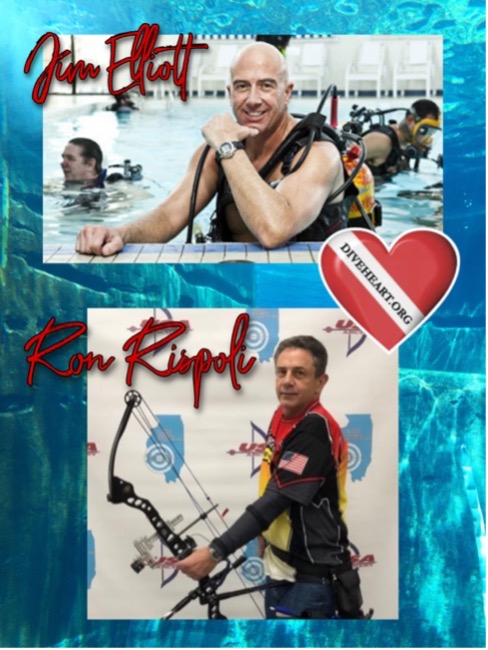EPISODE #10, SEASON 2

"Diveheart is really about therapy and how we can help people with their body, mind and spirit. Have them feel valued and give them a purpose, a reason to get up in the morning. It's amazing how powerful this is. We have the franchise on zero gravity. It's the closest thing there is to being an astronaut on earth."
Matt talks to Jim Elliott, founder of Diveheart, an organization that provides support educational scuba diving programs to any child, adult or veteran with a disability, with the hope of providing both physical and psychological therapeutic value to that person.
Joining Matt and Jim is Ron Rispoli, a Diveheart board member and recreation therapist, educating and introducing young adults with severe physical disabilities to adaptive leisure activities, including scuba diving. Ron is also, himself, a Paralympic athlete in archery, having lost the use of his right arm in a childhood accident.
The gentlemen discuss how Jim and Ron each discovered Diveheart and the incredible effects that water therapy can have on all types of individuals. Matt reveals that he is an epileptic, and thus is unable to dive per his doctor’s orders—but in the future, he may be a *guinea pig to help researchers better understand his condition and how water therapy can help. The guys also explore why boards are important, what “in-kind donations” are, and define exactly to what “Chicagoland” refers.
Ron Rispoli:
When you talk about scuba diving in general, I think 1% of the population dives. And I don't mean in the US, I mean worldwide. And if you talk about people with disabilities that dive, it's like 0.0001%. So there's very few people with disabilities that dive. And because it's gravity free, it's something that just about everybody can do. So we make certain that our participants get cleared medically, that they don't have any medical reasons why they can't dive, but just by having a disability should not preclude them from diving. And we've got an awesome group of volunteers, and we work with people that are quadriplegic, people that are blind, people that have autism, that need lots and lots of help and our volunteers are amazing helping these people do this.
Ron:
And when you get folks underwater, depending on their disability, especially when you talk about a cognitive disability, or autism, and you get them under water, they start focusing more. You know about ADHD and all that with people, you get them underwater, and you have them focus on one task or whatever, they are just laser focused on what they are doing. And when you're done, and they come up, you can see the joy in their face. And more so than that, when you see their families or their caregivers see how they're doing, it just makes everything 100% worth the effort that we put in because, it's changed their lives. So it's not just the participants, it's the families and the caregivers too that we change lives.
Matt Kamin:
I will say, on my end, I've always wanted to dive, I've always wanted to jump out of a plane, I'm epileptic. So, with epilepsy, I actually cannot do that, which is just such a bummer. I don't have seizures because I have medication and it works and thank God for that. But, it is one of those things that I really wish I could do but I am not allowed to.
Jim Elliott:
You may be able to in the future. We're trying to build a deep warm water therapy pool basically, that allows us to replicate some of the benefits we see in deep water in the ocean. You can't always go to the ocean, weather, travel, blah, blah, blah. But studying epilepsy is something we're very interested in helping to facilitate. Epilepsy is something that is a contraindication that keeps you from diving, because we don't want you to seize at depth, you know what I mean? Because we use a full face mask a lot, and we thought, wow, if we put a full face mask on you, Matt can seize, have a seizure and be fine because he's breathing still, he won't lose the regulator in his mouth, but doctors have said, look if this air gets trapped into the alveoli and you ascend, that expands. That could create a lung expansion injury. But, it's on our list to remedy so that you can dive.
Matt:
Listen Jim, if you can make that work I will happily fly to Chicago and I'll be your guinea pig.
LINKS:

The Tokyo 2020 Paralympic Games are being held August 24 - September 5. Find out more about the games, here.



